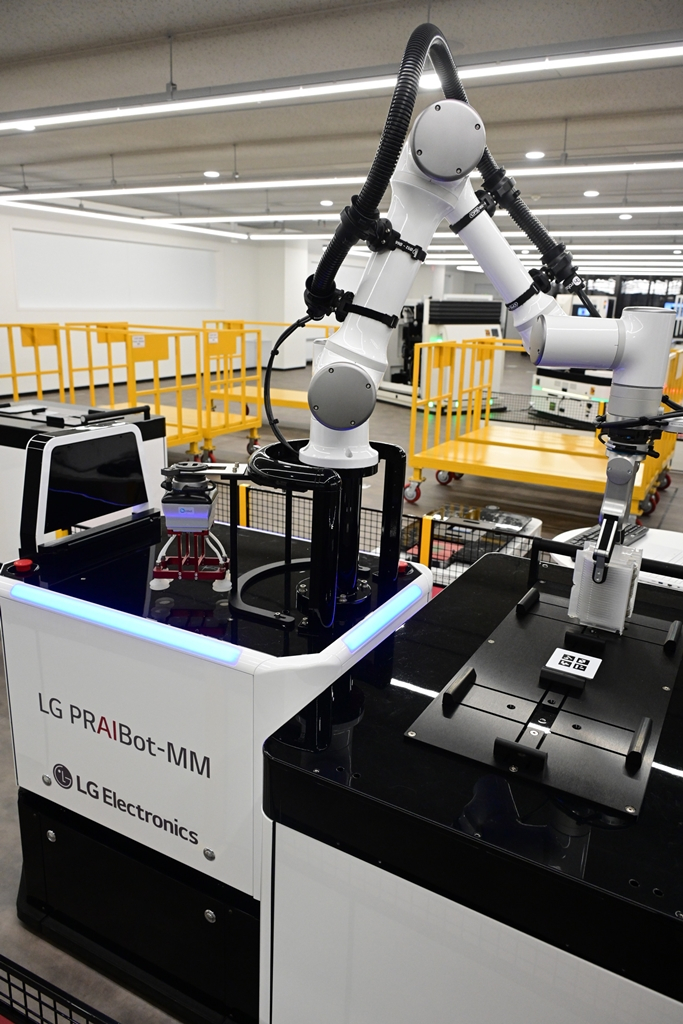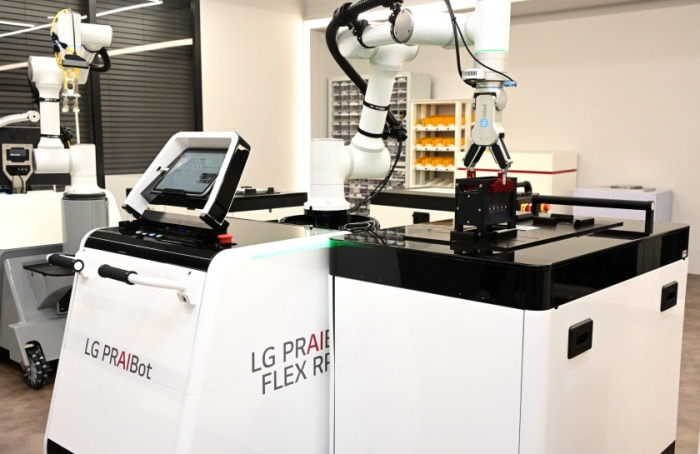Artificial intelligence
LG to foster smart factory business as new B2B growth driver
LG wins smart factory orders worth $145 mn in the first six months; to expand customer bases to semiconductor, bio, F&B
By Jul 18, 2024 (Gmt+09:00)
3
Min read
Most Read
When in S. Korea, it’s a ritual: Foreigners make stops at CU, GS25, 7-Eleven


Maybe Happy Ending: A robot love story that rewrote Broadway playbook


NPS yet to schedule external manager selection; PE firms’ fundraising woes deepen


Samsung steps up AR race with advanced microdisplay for smart glasses


Seoul appeal: Korean art captivates Indonesia’s affluent connoisseurs



PYEONGTAEK, Gyeonggi Province -- LG Electronics Inc., the leading global home appliance maker, aims to foster its smart factory business as a new growth engine generating billions of dollars in sales by 2030.
The South Korean tech giant said on Thursday that it is developing its in-house smart factory solutions, originally provided only to its affiliates, into a business-to-business (B2B) service with accumulated know-how from operating more than 60 factories worldwide.
LG Electronics, the flagship unit of South Korea’s fourth-largest conglomerate LG Group, launched the smart factory business with some 70 staff earlier this year to meet the growing demand for plants applied with artificial intelligence and digital transformation (DX) amid rising labor costs and shrinking populations.
“We have won deals (from external customers) worth about 200 billion won ($144.6 million) in the first six months,” said Song Shi-yong, head of LG Electronics’ smart factory business division. “Demand for smart factories is flooding, especially from companies building new plants in North America.”
LG Electronics aims to develop the smart factory division as one of its core B2B businesses as the global market is growing by 10% every year. The company set a goal to generate more than 40% of its sales from B2B businesses by 2030.
The world’s smart factory industry was forecast to rise 89% to $268.5 billion by 2030 from $155.6 billion last year, according to market research firm Precedence Research.
THE ONLY TOTAL SMART FACTORY SOLUTIONS PROVIDER IN KOREA
LG PRI, which has been working to improve the manufacturing competitiveness of the group’s affiliates, handles the smart factory business.
The unit secured over 1,000 patents based on 770 terabytes of production data accumulated from the group’s know-how on factory design, construction and operation over 66 years.
“Except for LG, few domestic companies are providing total solutions for the entire manufacturing process including factory planning, design, construction and operation,” Song said.
Its major clients include secondary battery makers, auto parts producers and logistics service operators.
The company aims to expand its customer bases into the semiconductor, bio and food and beverage sectors.

CUTTING-EDGE TECHNOLOGY
LG Electronics showcased its smart factory solutions technology through a scale model equipped with a real plant's AI and high-tech robots at the LG Digital Park in Pyeongtaek, about 60 kilometers (37 miles) south of Seoul.
AI filtered out defective products in real-time and monitored workers’ safety, while robots handled almost the entire manufacturing process from tightening screws to transporting the finished products.
LG Electronics’ smart factory technology has been recognized globally. The World Economic Forum (WEF) selected two of its plants – one in Changwon, South Gyeongsang Province, and the other in Clarksville, Tennessee – as lighthouse factories.
The WEF named only 153 plants worldwide as lighthouse factories, facilities powered by Fourth Industrial Revolution technologies, such as the Internet of Things, big data, AI and robots.
LG Electronics’ smart factory solutions focus on reducing delays and errors.
A refrigerator production line at the Changwon plant manufactures a unit in 13 seconds, for example. A 10-minute delay will interrupt the production of nearly 50 refrigerators, resulting in a loss of some 100 million won based on the fridge selling for about 2 million won.

“The introduction of smart factory solutions at the Changwon plant raised its productivity by 17% and energy efficiency by 30%,” said an LG Electronics official, adding quality costs stemming from defects there fell 70%.
Write to Eui-Myung Park at uimyung@hankyung.com
Jongwoo Cheon edited this article.
More to Read
-

-
 ElectronicsLG Elec to fend off challengers with tech supremacy: H&A Head Ryu
ElectronicsLG Elec to fend off challengers with tech supremacy: H&A Head RyuSep 03, 2023 (Gmt+09:00)
3 Min read -

-
 Artificial intelligenceLS Electric, Microsoft to jointly develop smart factory
Artificial intelligenceLS Electric, Microsoft to jointly develop smart factoryApr 20, 2023 (Gmt+09:00)
1 Min read -

-
 ElectronicsLG Electronics turns home appliance plant into smart factory
ElectronicsLG Electronics turns home appliance plant into smart factorySep 16, 2021 (Gmt+09:00)
2 Min read
Comment 0
LOG IN


